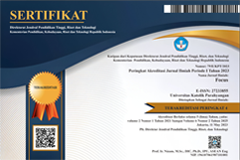Simbol Moderasi Beragama dalam Praktik Keseharian Masyarakat Kampung Rehobot Indramayu: Studi Pluralisme dan Toleransi Antar Umat Beragama
DOI:
https://doi.org/10.26593/focus.v4i2.7365Keywords:
Religious Moderation, Religious Pluralism, Symbols of Religious Moderation, Rehobot Village, Interfaith ToleranceAbstract
This research explores the symbols of religious moderation in the daily practices of the community in Rehobot Village, Indramayu, West Java, as a response to the complexity of the pluralistic ecosystem in Indonesia. The main focus is on conflicts between religious communities caused by negative prejudices and violations of Freedom of Religion and Belief. In response, the government has initiated the Moderation of Religion program, aiming to foster an inclusive attitude and uphold human rights amidst religious diversity. The research employs a qualitative approach, utilizing observation, in-depth interviews, and literature review techniques to uncover symbols of religious moderation in Rehobot Village. The findings indicate that everyday practices, such as non-segregated public burials, cross-faith sports activities, and mutual support in religious celebrations, serve as symbols of religious moderation deeply rooted in Rehobot's cultural fabric. Furthermore, the Village Bhinneka policy and the roles of religious leaders as unifiers and promoters of tolerance strengthen religious moderation at the local level. These practices reflect the commitment of the Rehobot community to harmoniously coexist amidst diverse beliefs, creating an inclusive environment that can serve as an example for other communities in fostering tolerance and interfaith dialogue. This research provides profound insights into how symbols of religious moderation can serve as crucial pillars in supporting the pluralistic ecosystem in Indonesia.
References
As’ad. (2021). Being al-wasatiyah agents: The role of azharite organization in the moderation of Indonesian religious constellation. Journal of Islamic Thought and Civilization, 11(2), 124–145. https://doi.org/10.32350/jitc.11.2.07
Bolo, A. D., Purwanti, P., Louk, V., Biliyandi, M. E., Ritan, F. P., & Pantur, B. (2022). Implementasi Pandangan Plato tentang Negara Ideal dalam Toleransi Umat Beragama di Indonesia. Focus, 3(2), 63–70. https://doi.org/10.26593/focus.v3i2.6091
Febriani, S. R. (2022). The Perception of Millennial Generation on Religious Moderation through Social Media in the Digital Era. Millah: Journal of Religious Studies, 21(2), 313–334. https://doi.org/10.20885/millah.vol21.iss2.art1
Geertz, C. (1973). The interpretation of cultures (Vol. 5019). Basic books.
Hasan, N. (2017). Religious diversity and blasphemy law: Understanding growing religious conflict and intolerance in post-Suharto Indonesia. Al-Jami’ah: Journal of Islamic Studies, 55(1), 105–126.
Helmy, M. I. (2021). The Understanding of Islamic Moderation (wasaṭiyyah al-Islam) and the Hadiths on Inter-religious relations in the Javanese Pesantrens. Indonesian Journal of Islam and Muslim Societies, 11(2), 377–401. https://doi.org/10.18326/ijims.v11i2.377-401
Idharoel Haq, A. M., & Ziaulhaq, M. (2021). Studi Kebencian: Analisis Komparasi Pemikiran Bediüzzaman Said Nursi (1877-1960) dan K. H. Ahmad Dahlan (1868-1923). MELINTAS, 35(3), 258–278. https://doi.org/10.26593/mel.v35i3.4660.258-278
Intan, B. F. (2015). Misi Kristen Di Indonesia: Kesaksian Kristen Protestan. Societas Dei: Jurnal Agama Dan Masyarakat, 2(2), 325.
Jakatarub. (2023). Wifi: Wakening Interfaith Initiative. Digitalisasi Manajemen Komunitas Dengan Pendekatan Berbasis Hak Asasi Manusia dan Tanpa Permusuhan. Jakatarub.
Kementerian Agama RI. (2019). Moderasi Beragama. Badan Litbang dan Diklat Kementerian Agama RI. https://doi.org/10.1017/CBO9781107415324.004
Maxwell, J. A. (2008). Designing a qualitative study. The SAGE Handbook of Applied Social Research Methods, 2, 214–253.
Mulyadi, R. M. (2020). Sejarah penyebaran agama Kristen di indramayu. MOZAIK Jurnal Ilmu-Ilmu Sosial Dan Humaniora, 10(2). https://doi.org/10.21831/moz.v10i2.32464
Nasir, M. A. (2020). Conflict, peace, and religious festivals: Muslim-hindu-christian relations on the Eastern Indonesian island of lombok. Interreligious Studies and Intercultural Theology, 4(1), 102–123. https://doi.org/10.1558/isit.36471
Nurdin, A. A., Jamaludin, A. N., Supriatna, E., & Kustana, K. (2019). The dynamic of religious life: A study of conflict and integration of Ahmadiyah in Garut, Tasikmalaya and Kuningan, West Java. Komunitas: International Journal of Indonesian Society and Culture, 11(1), 63–74.
Ramstedt, M. (2019). Prospects of pluralism in Indonesia gauged from a legal anthropological perspective. In Asian Journal of Social Science (Vol. 47, Issue 3, pp. 309–339). https://doi.org/10.1163/15685314-04703003
Riady, A. S. (2021). Agama dan Kebudayaan Masyarakat Perspektif Clifford Geertz. Jurnal Sosiologi Agama Indonesia, 2(1), 13–22.
Santiawan, I. N., & Warta, I. N. (2021). Dialog Lintas Iman Sebagai Upaya Memperkuat Moderasi Beragama. Widya Aksara Jurnal Agama Hindu, 26(1), 105.
Sari, Y., & Wasi, P. S. S. (2022). Religious Legitimacy in Realizing Harmony in Indonesia. Focus, 3(2), 113–123.
Setara Institute. (2022). Kondisi Kebebasan Beragama dan Berkeyakinan (KBB) 2022. Setara Institute.
Sihombing, A. A. (2020). Nostra aetate and space for religious moderation: Interfaith dialogue in multicultural Indonesia. Journal for the Study of Religions and Ideologies, 19(55), 142–157. https://api.elsevier.com/content/abstract/scopus_id/85079701358
Stange, G. (2019). The Danger of Intolerant Above-ground, Non-clandestine Organizations is Bigger for Indonesia Than Violent Extremism: An Interview with Sidney Jones on Religious Extremism, Political Violence and Conflict Dynamics in Indonesia. ASEAS-Austrian Journal of South-East Asian Studies, 12(2), 267–274.
Sukamto, A. (2022). Muslim-Christian Relations and Collaborative Efforts to Build Indonesia. International Bulletin of Mission Research, 46(4), 525–539.
Sukamto, A. (2023). The Role of Entrepreneurs in the Development of Protestant Christianity in East Java in the Nineteenth Century. International Journal of Asian Christianity, 6(2), 184–207.
Syakhrani, A. W., & Kamil, M. L. (2022). Budaya dan Kebudayaan: Tinjauan Dari Berbagai Pakar, Wujud-Wujud Kebudayaan, 7 Unsur Kebudayaan Yang Bersifat Universal (Vol. 5, Issue 1).
Tenriawali, A. Y., & Taufik, T. (2020). BAHASA, PRASANGKA, DAN SARA DI MEDIA SOSIAL INDONESIA. Gramatika: Jurnal Ilmiah Kebahasaan Dan Kesastraan, 8(2), 98–108.
Tim Penyusun Kementerian Agama. (2019). Tanya Jawab Moderasi Beragama. Badan Litbang Dan Diklat Kemenag RI.
Wahyuni, D., Susilawati, S., & Liza, M. (2022). Dialog Antaragama: Mereduksi Prasangka dan Memperkuat Integrasi Sosial Masyarakat. Wardah, 23(1), 53–65.
Wolterbeek, J. D. (1995). Babad Zending di Pulau Jawa. Taman Pustaka Kristen.

Downloads
Published
Issue
Section
License
Copyright (c) 2023 Yohanes Irmawandi, Mufti Nur Hidayat

This work is licensed under a Creative Commons Attribution-ShareAlike 4.0 International License.



















